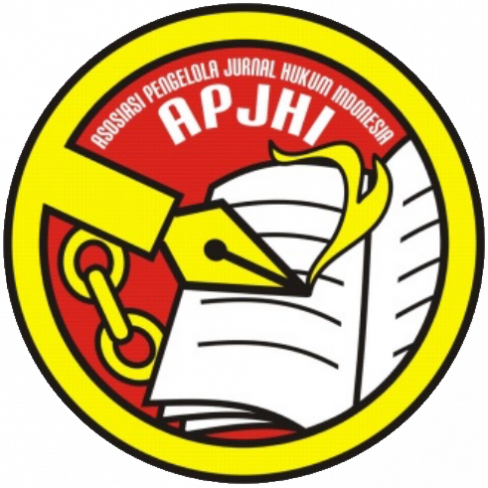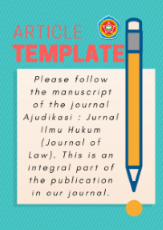Roles of Public Prosecutor's Office in Restorative Justice: A Focus on Prosecution Discontinuation Regulations
DOI:
https://doi.org/10.30656/ajudikasi.v7i2.7377Keywords:
Prosecutor's Office, Attorney, Termination of Prosecution, Restorative JusticeAbstract
The implementation of restorative justice in criminal cases is crucial for upholding humanitarian values that prioritize the recovery and protection of both victims and offenders. This approach seeks to restore the situation to its original state without solely focusing on punishing the perpetrator, marking a paradigm shift towards reconciliation and healing. In Indonesia, restorative justice aligns with the societal need for more inclusive prosecutorial and judicial authority. Pre-court resolution of criminal cases must explore the potential for resolution before reaching a conviction. The Prosecutor's Office of the Republic of Indonesia holds a central role in executing this approach.The issuance of Prosecution Regulations Republic of Indonesia Number 15 of 2020, concerning the Termination of Prosecution Based on Restorative Justice, provides concrete guidance for the Attorney General of the Republic of Indonesia. This regulation emphasizes the recovery and protection of victims, aligning with broader aspects of humanity and justice. The primary objective is to establish public order, justice, truth, and legal certainty based on existing laws and values such as morality, religious norms, and courtesy. The Prosecution Regulations aims to encourage a more humane and conscientious approach by the Public Prosecutor, prioritizing the recovery of victims and the rehabilitation of offenders. This departure from traditional punitive thinking contributes positively to society. As an integral part of Indonesia's criminal justice system, the Prosecutor's Office bears significant responsibility in creating legal certainty, truth, legal order, and justice based on human values, morality, courtesy, and religious norms.This shift reflects a positive change in a criminal justice system that increasingly emphasizes inclusivity and social healing. Restorative justice goes beyond being a conceptual framework; it signifies a commitment to instigate positive transformations in the handling of criminal cases in Indonesia, ensuring that human values and justice form the bedrock of the justice system.
Downloads
References
Adwi Mulyana Hadi, Anik Iftitah, and Syahrul Alamsyah. “Restorative Justice Through Strengthening Community Legal Culture in Indonesia: Challenges and Opportunity.†Mulawarman Law Review 8, no. 1 (2023). https://doi.org/https://doi.org/10.30872/mulrev.v8i1.1140.
Agung, Badilum Mahkamah. Surat Keputusan Dirjen Badan Peradilan Umum tentang Pedoman Penerapan Restorative Justice di Lingkungan Peradilan Umum, 2020. https://badilum.mahkamahagung.go.id/index.php?option=com_attachments&task=download&id=811.
Asshiddiqie, Jimly. Penegakan Hukum yang Menjamin Kepastian Hukum dan Rasa Keadilan Masyarakat, Suatu Sumbangan Pemikiran. Makalah. Seminar “Menyoal Moral Penegak Hukum†dalam rangka Lustrum XI Fakul^s Hukum Universitas Gadjah Mada, 2006. http://jimly.com/pemikiran/makalah.
Fernando, Zico Junius. “Pentingnya Restorative Justice dalam Konsep Ius Constituendum.†Jurnal Pemerintahan & Politik Islam 5, no. 2 (2020).
Ibrahim, Johnny. Teori & Metodologi Penelitian Hukum Normatif. Malang: Bayumedia Publising, 2011.
Iftitah, Anik, ed. Metode Penelitian Hukum. Mei 2023. Sada Kurnia Pustaka, 2023.
———, ed. Perkembangan Hukum Pidana di Indonesia. Sada Kurnia Pustaka, 2023. https://sadapenerbit.com/2023/10/23/perkembangan-hukum-pidana-di-indonesia/.
Kartayasa, Mansyur. “Restorative Juctice Dan Prospeknya Dalam Kebijakan Legislasi,†2012.
Keisha April, Shannon W. Schrader, Toni E. Walker, Robert M. Francis, Hector Glynn, Derrick M. Gordon. “Conceptualizing Juvenile Justice Reform: Integrating the Public Health, Social Ecological, and Restorative Justice Models.†Children and Youth Services Review 148 (2023). https://doi.org/https://doi.org/10.1016/j.childyouth.2023.106887.
Kejaksaan, Peraturan. Peraturan Kejaksaan RI Nomor 15 Tahun 2020 tentang Penghentian Penuntutan Berdasarkan Keadilan Restoratif (2020).
Marder, Ian D. “Mapping Restorative Justice and Restorative Practices in Criminal Justice in the Republic of Ireland.†International Journal of Law, Crime and Justice 70 (2022). https://doi.org/https://dx.doi.org/10.1016/j.ijlcj.2022.100544.
Mertokusumo, Sudikno. Bab-Bab Tentang Penemuan Hukum. Yogyakarta: Citra Aditya Bakti, 1993.
Mirza, I. M. M. ., & Zen, A. P. “Strategi Internalisasi Asas Restorative Justice Dalam Sistem Peradilan Indonesia.†Pancasila: Jurnal Keindonesiaan 2, no. 2 (2022). https://doi.org/https://doi.org/10.52738/pjk.v2i2.45.
Muladi. Kapita Selekta Hukum Pidana. Semarang: Badan Penerbit Universitas Diponegoro, 1995.
Palsari, Cahya. “Kajian Pengantar Ilmu Hukum : Tujuan Dan Fungsi Ilmu Hukum Sebagai Dasar Fundamental Dalam Penjatuhan Putusan Pengadilan.†E-Journal Komunitas Yustisia Universitas Pendidikan Ganesha 4, no. 33 (2021): 940–50.
Rahardjo, Satjipto. Ilmu Hukum. Bandung: Citra Aditya Bakti, 2012.
Wiwin, H. Syafa’at Anugrah Pradana, and Muhammad Imam Dhiya’ul Haq. “The Regulation of Articles on State Institutional Insults to The Right to Freedom of Expression in Indonesia: A Critical Review.†Mulawarman Law Review 8, no. 1 (2023). https://doi.org/https://doi.org/10.30872/mulrev.v8i1.1122.
Downloads
Published
Issue
Section
License
Authors who publish with this journal agree to the following terms:
Authors retain copyright and grant the journal right of first publication with the work simultaneously licensed under a Creative Commons Attribution License that allows others to share the work with an acknowledgment of the work's authorship and initial publication in this journal.
Authors can enter into separate, additional contractual arrangements for the non-exclusive distribution of the journal's published version of the work (e.g., post it to an institutional repository or publish it in a book) with an acknowledgment of its initial publication in this journal.
Authors are permitted and encouraged to post their work online (e.g., in institutional repositories or on their website) before and during the submission process, as it can lead to productive exchanges and earlier and greater citation of published work.
All articles in Ajudikasi : Jurnal Ilmu Hukum can be disseminated provided they include the identity of the article and the source of the article (Ajudikasi : Jurnal Ilmu Hukum). The publisher is not responsible for the contents of the article. The content of the article is the sole responsibility of the author
Ajudikasi : Jurnal Ilmu Hukum is lincensed under a Creative Commons Attribution-ShareAlike 4.0 International License.









1.png)
.png)
.png)





.png)
.png)
.png)
.png)





.png)







